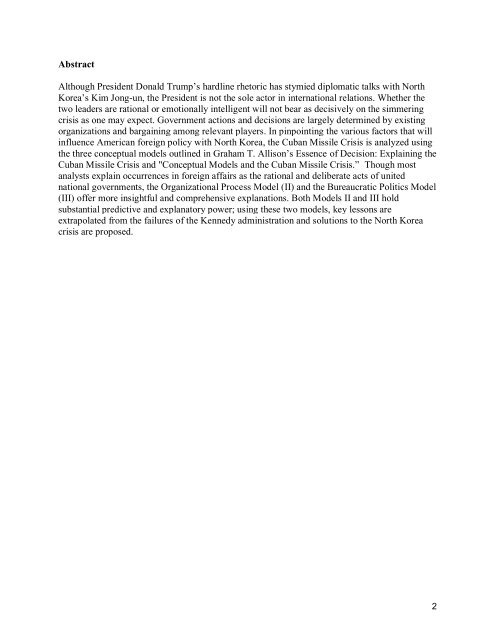In the Event of a North Korean Missile Crisis
Although President Donald Trump’s hardline rhetoric has stymied diplomatic talks with North Korea’s Kim Jong-un, the President is not the sole actor in international relations. Whether the two leaders are rational or emotionally intelligent will not bear as decisively on the simmering crisis as one may expect. Government actions and decisions are largely determined by existing organizations and bargaining among relevant players. In pinpointing the various factors that will influence American foreign policy with North Korea, the Cuban Missile Crisis is analyzed using the three conceptual models outlined in Graham T. Allison’s Essence of Decision: Explaining the Cuban Missile Crisis and "Conceptual Models and the Cuban Missile Crisis.” Though most analysts explain occurrences in foreign affairs as the rational and deliberate acts of united national governments, the Organizational Process Model (II) and the Bureaucratic Politics Model (III) offer more insightful and comprehensive explanations. Both Models II and III hold substantial predictive and explanatory power; using these two models, key lessons are extrapolated from the failures of the Kennedy administration and solutions to the North Korea crisis are proposed.
Although President Donald Trump’s hardline rhetoric has stymied diplomatic talks with North Korea’s Kim Jong-un, the President is not the sole actor in international relations. Whether the two leaders are rational or emotionally intelligent will not bear as decisively on the simmering crisis as one may expect. Government actions and decisions are largely determined by existing organizations and bargaining among relevant players. In pinpointing the various factors that will influence American foreign policy with North Korea, the Cuban Missile Crisis is analyzed using the three conceptual models outlined in Graham T. Allison’s Essence of Decision: Explaining the Cuban Missile Crisis and "Conceptual Models and the Cuban Missile Crisis.” Though most analysts explain occurrences in foreign affairs as the rational and deliberate acts of united national governments, the Organizational Process Model (II) and the Bureaucratic Politics Model (III) offer more insightful and comprehensive explanations. Both Models II and III hold substantial predictive and explanatory power; using these two models, key lessons are extrapolated from the failures of the Kennedy administration and solutions to the North Korea crisis are proposed.
You also want an ePaper? Increase the reach of your titles
YUMPU automatically turns print PDFs into web optimized ePapers that Google loves.
Abstract<br />
Although President Donald Trump’s hardline rhetoric has stymied diplomatic talks with <strong>North</strong><br />
Korea’s Kim Jong-un, <strong>the</strong> President is not <strong>the</strong> sole actor in international relations. Whe<strong>the</strong>r <strong>the</strong><br />
two leaders are rational or emotionally intelligent will not bear as decisively on <strong>the</strong> simmering<br />
crisis as one may expect. Government actions and decisions are largely determined by existing<br />
organizations and bargaining among relevant players. <strong>In</strong> pinpointing <strong>the</strong> various factors that will<br />
influence American foreign policy with <strong>North</strong> Korea, <strong>the</strong> Cuban <strong>Missile</strong> <strong>Crisis</strong> is analyzed using<br />
<strong>the</strong> three conceptual models outlined in Graham T. Allison’s Essence <strong>of</strong> Decision: Explaining <strong>the</strong><br />
Cuban <strong>Missile</strong> <strong>Crisis</strong> and "Conceptual Models and <strong>the</strong> Cuban <strong>Missile</strong> <strong>Crisis</strong>.” Though most<br />
analysts explain occurrences in foreign affairs as <strong>the</strong> rational and deliberate acts <strong>of</strong> united<br />
national governments, <strong>the</strong> Organizational Process Model (II) and <strong>the</strong> Bureaucratic Politics Model<br />
(III) <strong>of</strong>fer more insightful and comprehensive explanations. Both Models II and III hold<br />
substantial predictive and explanatory power; using <strong>the</strong>se two models, key lessons are<br />
extrapolated from <strong>the</strong> failures <strong>of</strong> <strong>the</strong> Kennedy administration and solutions to <strong>the</strong> <strong>North</strong> Korea<br />
crisis are proposed.<br />
2


